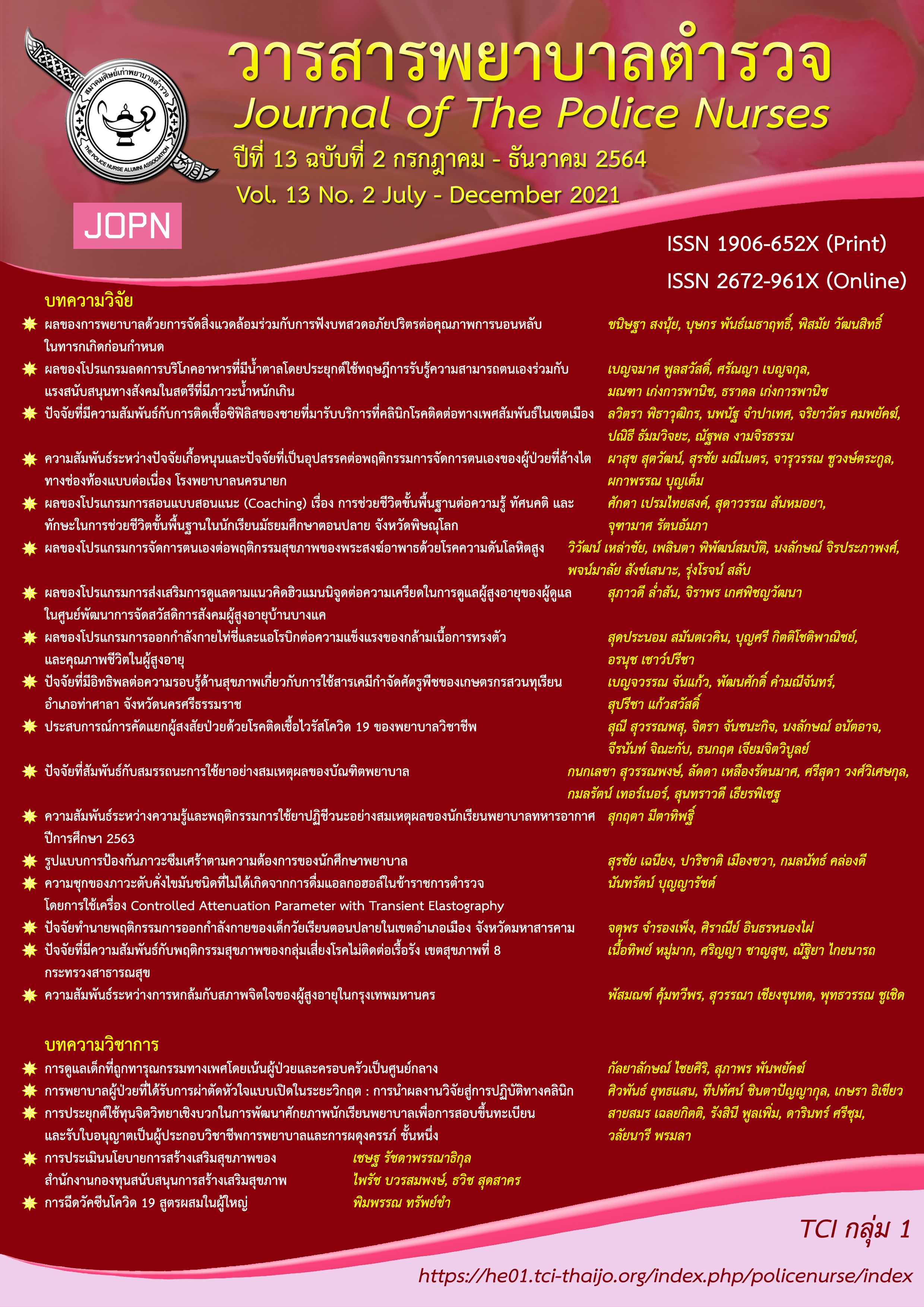EFFECTS OF SELF-MANAGEMENT PROGRAM ON HEALTH BEHAVIORS AMONG BUDDHIST MONKS WITH HYPERTENSION DISEASE
Keywords:
self-management, Buddhist monks, hypertensionAbstract
This quasi-experimental research with a two-group pretest-posttest design was aimed to compare health-behavior scores and blood pressure scores of the Buddhist monks with hypertension between the self-management program group and the control group receiving the usual care. The sample group was 60 Buddhist monks, aged between 40 to 70 years old with hypertension and received services from the medicine outpatient department at Priest hospital. The experimental tool was a self-management program. Questionnaires for collecting data consisted of a personal data, the health data and behavior. Their content validity indices were .92 and .95, respectively, and the Cronbach’s alpha coefficient was .93. The data were analyzed using frequency, percentage, mean, standard deviation, and t-test statistics, both independent and dependent.
The results showed that the experimental group had a statistically and significantly higher mean score on health behaviors than the control group (p = .000). They also had a lower mean score of systolic blood pressure (M = 128.27, SD = 9.69) and diastolic blood pressure (M = 89.37, SD = 7.56) than the control group with statistical significance (p = .000).
Downloads
References
Assantachai, P. (2017). Handbook of monks' health care. Faculty of Medicine Siriraj Hospital, Mahidol University.
Creer, L. (2000). Self-management and the control of chronic pediatric illness. Promoting adherence to medical treatment in chronic childhood illness: Concepts, methods, and interventions, 95-129.
Kaewyok, T., Wongpiriyayotha, A., & Nantsupawat, W. (2011). Effects of self-management program on symptom of dyspnea and functional capacity of persons with congestive heart failure. Journal Nursing and Health Care, 29(2), 35-40.
Office of Policy and Strategy Office of the Permanent Secretary. (2018). Public health statistics 2015. Bangkok: Sam Charoen Phanich.
Park, J., Noh, O., & Jung, S. (2019). Coping with symptoms after education for self-management of chronic diseases. International Journal of Advanced Culture Technology, 7(1), 89-95.
Phatiapinan, A. Torsakulkaew, T., & Leelahakul, V. (2018). The effects of self–management program of hypertensive patients with chronic kidney disease stage 3 on self –management behaviors and blood pressure. Thai Journal of Cardio-Thoracic Nursing, 29(2), 12-27.
Polit, F., & Beck, T. (2004). Nursing research: Principles and methods (7th ed.). Philadelphia, PA: Lippincott Williams & Wilkins.
PraSuwithanphatthanabundit, Daenghan, T., & Waphatwitee, S. (2015). Development of a holistic healthcare model of the monks in different Khon Kaen province with separate participation of the network. Journal of Disease Prevention and Control 7 Khon Kaen, 22(2), 117-129.
Priest Hospital. (2017). Health check-up project for novices monks 2017. Bangkok: Department of Medical Affairs.
Promsena, Y. (2007). Self-care behavior of patients. Hypertension at the Hypertension Clinic Nakhon Phing hospital Chiang Mai province (Master of public health). Graduate school, Chiang Mai University, Chiang Mai.
Santasana, C., & Wattana, C. (2017). The effectiveness of the development of a home visit model for people with uncontrolled hypertension of the Health Promoting hospital, Khlong Poon subdistrict, Klaeng district, Rayong province. The Journal of Prapokklao Hospital Clinical Medical Education Center, 34(2), 110-123.
The International Society of Hypertension (ISH). (2020). Background information on high blood pressure (hypertension). Retrieved from http://ish-world.com/public/backgroundinfo.html
World Health Organization. (2019). New data highlight increases in hypertension, diabetes incidence. Retrieved from http://www.who.int/mediacentre/news/releases/2019/worldhealth_statistics_20120516/en/index.html
Zhou, B., Danaei, G., Stevens, G. A., Bixby, H., Taddei, C., Carrillo-Larco, R. M., . . . Ezzati, M. (2019). Long-term and recent trends in hypertension awareness, treatment, and control in 12 high-income countries: an analysis of 123 nationally representative surveys. The Lancet, 394(10199), 639-651.
Downloads
Published
How to Cite
Issue
Section
License
ผลงานที่ได้ตีพิมพ์แล้วจะเป็นลิขสิทธิ์ของวารสารพยาบาลตำรวจ















